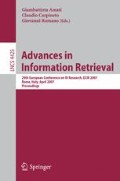Abstract
With existing collaborative filtering algorithms, a user has to rate a sufficient number of items, before receiving reliable recommendations. To overcome this limitation, we provide the insight that correlations between items can form a network, in which we examine transitive correlations between items. The emergence of power laws in such networks signifies the existence of items with substantially more transitive correlations. The proposed algorithm finds highly correlative items and provides effective recommendations by adapting to user preferences. We also develop pruning criteria that reduce computation time. Detailed experimental results illustrate the superiority of the proposed method.
Access this chapter
Tax calculation will be finalised at checkout
Purchases are for personal use only
Preview
Unable to display preview. Download preview PDF.
References
Agrawal, R., Srikant, R.: Fast algorithms mining association rules in large databases. Technical Report RJ 9839, IBM Almaden Research Center, San Jose California (1994)
Breese, J., Heckerman, D., Kadie, C.: Empirical analysis of predictive algorithms for collaborative filtering. In: Proc. Conf. on Uncertainty in Artificial Intelligence, pp. 43–52 (1998)
Claypool, M., Le, M.W.P., Brown, D.C.: Implicit interest indicators. In: Proc. IUI Conf. (2001)
Deshpande, M., Karypis, G.: Item-based top-n recommendation algorithms. ACM Trans. on Information Systems 22(1), 143–177 (2004)
Goldberg, D., et al.: Using collaborative filtering to weave an information tapestry. ACM Communications 35(12), 61–70 (1992)
Herlocker, J., et al.: An algorithmic framework for performing collaborative filtering. In: Proc. ACM SIGIR Conf., pp. 230–237. ACM Press, New York (1999)
Herlocker, J., et al.: Evaluating collaborative filtering recommender systems. ACM Trans. on Information Systems 22(1), 5–53 (2004)
Huang, Z., Chen, H., Zeng, D.: Applying associative retrieval techniques to alleviate the sparsity problem in collaborative filtering. ACM Trans. on Information Systems 22(1), 116–142 (2004)
Linden, G., Smith, B., York, J.: Amazon.com recommendations: Item-to-item collaborative filtering. IEEE Internet Computing 7(1), 76–80 (2003)
Maltz, D., Ehrlich, K.: Pointing the way: Active collaborative filtering. In: Proc. CHI Conf., pp. 202–209 (1995)
Mobasher, B., et al.: Improving the effectiveness of collaborative filtering on anonymous web usage data. In: Proc. Workshop Intelligent Techniques for Web Personalization, pp. 53–60 (2001)
Papagelis, M., Plexousakis, D., Kutsuras, T.: Alleviating the sparsity problem of collaborative filtering using trust inferences. In: Proc. iTrust Conf., pp. 224–239 (2005)
Resnick, P., et al.: Grouplens: An open architecture for collaborative filtering on netnews. In: Proc. Conf. Computer Supported Collaborative Work, pp. 175–186 (1994)
Sarwar, B., et al.: Analysis of recommendation algorithms for e-commerce. In: Proc. ACM Electronic Commerce Conf., pp. 158–167. ACM Press, New York (2000)
Sarwar, B., et al.: Item-based collaborative filtering recommendation algorithms. In: Proc. WWW Conf., pp. 285–295 (2001)
Schein, A.I., Popescul, A., Ungar, L.H.: Methods and metrics for cold-start recommendations. In: Proc. ACM SIGIR Conf., ACM Press, New York (2002)
Wang, J., de Vries, A.P., Reinders, M.J.: Unifying user-based and item-based collaborative filtering approaches by similarity fusion. In: Proc. ACM SIGIR Conf., ACM Press, New York (2006)
Wang, J., de Vries, A.P., Reinders, M.J.T.: A user-item relevance model for log-based collaborative filtering. In: Lalmas, M., et al. (eds.) ECIR 2006. LNCS, vol. 3936, pp. 37–48. Springer, Heidelberg (2006)
Xue, G., Lin, C., Yang, Q.e.: Scalable collaborative filtering using cluster-based smoothing. In: Proc. ACM SIGIR Conf., pp. 114–121. ACM Press, New York (2005)
Author information
Authors and Affiliations
Editor information
Rights and permissions
Copyright information
© 2007 Springer Berlin Heidelberg
About this paper
Cite this paper
Nanopoulos, A. (2007). Collaborative Filtering Based on Transitive Correlations Between Items. In: Amati, G., Carpineto, C., Romano, G. (eds) Advances in Information Retrieval. ECIR 2007. Lecture Notes in Computer Science, vol 4425. Springer, Berlin, Heidelberg. https://doi.org/10.1007/978-3-540-71496-5_34
Download citation
DOI: https://doi.org/10.1007/978-3-540-71496-5_34
Publisher Name: Springer, Berlin, Heidelberg
Print ISBN: 978-3-540-71494-1
Online ISBN: 978-3-540-71496-5
eBook Packages: Computer ScienceComputer Science (R0)

